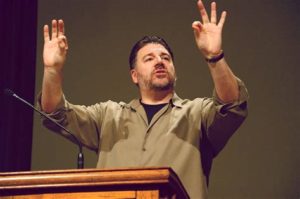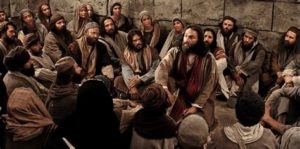 Author/Pastor James Emery White wrote a book a few years back called The Rise of the Nones. Fortunately, you can see by the spelling in the title that it is not a book about gangs of black and white clad ladies overrunning the streets with rosary-bead num-chucks. The book, instead, covers a rapidly growing segment of the US and UK population. On almost every census form we see a list of various denominations followed by the category “none.” In 1940 five percent of the US population marked none, meaning they
Author/Pastor James Emery White wrote a book a few years back called The Rise of the Nones. Fortunately, you can see by the spelling in the title that it is not a book about gangs of black and white clad ladies overrunning the streets with rosary-bead num-chucks. The book, instead, covers a rapidly growing segment of the US and UK population. On almost every census form we see a list of various denominations followed by the category “none.” In 1940 five percent of the US population marked none, meaning they  had “no religious affiliation.” Fifty years later in 1990 it had risen to eight percent which is a very modest increase. Fast-forward eighteen years to 2008 and in that same U.S. study the number became 15 percent. After the next four years in the Pew Forum on Religion and Public Life’s 2012 study it became 19.3 percent. That’s one in five Americans who do not affiliate themselves with a church. Unfortunately, this rapid increase does not seem to be slowing down any time soon.
had “no religious affiliation.” Fifty years later in 1990 it had risen to eight percent which is a very modest increase. Fast-forward eighteen years to 2008 and in that same U.S. study the number became 15 percent. After the next four years in the Pew Forum on Religion and Public Life’s 2012 study it became 19.3 percent. That’s one in five Americans who do not affiliate themselves with a church. Unfortunately, this rapid increase does not seem to be slowing down any time soon.
The challenge for churches (and consequently for us as individuals) is multifaceted, and though answers are hard to come by, one thing is for sure- the church as we  know it is in crisis, and we cannot ignore the problem and hope that it will go away. White says that one of the main reasons churches are struggling is because they are using an Acts 2 model with an Acts 17 culture. He believes that until we change that mindset, the church will continue to decline as more and more people check the “none of the above” box. As we look around the world the US and European countries lead the way for the ever-increasing number of “nones.” Britain has reached the twenty-five percent mark and Scotland leads the disintegration at thirty-five percent. Surprisingly, many African, Middle Eastern, and Asian countries are seeing an explosion of Christian growth. Why the disparity?
know it is in crisis, and we cannot ignore the problem and hope that it will go away. White says that one of the main reasons churches are struggling is because they are using an Acts 2 model with an Acts 17 culture. He believes that until we change that mindset, the church will continue to decline as more and more people check the “none of the above” box. As we look around the world the US and European countries lead the way for the ever-increasing number of “nones.” Britain has reached the twenty-five percent mark and Scotland leads the disintegration at thirty-five percent. Surprisingly, many African, Middle Eastern, and Asian countries are seeing an explosion of Christian growth. Why the disparity?
In Acts 2 when the disciples experienced the coming of the Holy Spirit at Pentecost, the onlookers supposed they were drunk because of their babblings and actions. But Peter set them straight when he said, “But this is that which was spoken by the prophet Joel; And it shall come to pass in the last days, saith God, I will pour out of my Spirit upon all flesh: and your sons and your daughters shall prophesy, and your young men shall see visions, and your old men shall dream dreams: (Acts 2:16-17) He went on to quote
them straight when he said, “But this is that which was spoken by the prophet Joel; And it shall come to pass in the last days, saith God, I will pour out of my Spirit upon all flesh: and your sons and your daughters shall prophesy, and your young men shall see visions, and your old men shall dream dreams: (Acts 2:16-17) He went on to quote
more of the Old Testament regarding the prophecied day of Pentecost. Why is that significant? Because he was quoting the Old Testament without explanation. The people he was speaking to knew what he was talking about. They all had a deep belief in the God of the Old Testament. Paul was using scripture that they understood- that they cared about. They were deeply religious and had, since youth, been exposed the stories, prophecies, and people of the Word as it was constructed to that point. When Peter quotes Joel and later in the chapter takes words from Psalm 16, he does not have to explain those verses to his audience.  Peter used scripture that the people around him already knew as a springboard to Jesus.
Peter used scripture that the people around him already knew as a springboard to Jesus.
After he sets the table with Old Testament scriptures, he serves them up these hard words: “Men of Israel, hear these words: Jesus of Nazareth, a man attested to you by God with mighty works and wonders and signs that God did through him in your midst, as you yourselves know— this Jesus, delivered up according to the definite plan and foreknowledge of God, you crucified and killed by the hands of lawless men. God raised him up, loosing the pangs of death, because it was not possible for him to be held by it.” (Acts 2:22-24) Peter, who denied Christ three times, hid himself from authorities, and made plans to go back to fishing, stood in the open boldly proclaiming the Messiahship of Christ, accusing the peoples of his death, and revealing His resurrection. Notice  that there was a minimum of explanation because the people he was speaking to and would speak to in the rest of Acts, already knew where he was coming from. They were a monotheistic people who valued the Word and knew what Peter was saying because he built his argument on knowledge they already had.
that there was a minimum of explanation because the people he was speaking to and would speak to in the rest of Acts, already knew where he was coming from. They were a monotheistic people who valued the Word and knew what Peter was saying because he built his argument on knowledge they already had.
Today we address those outside the church as though they have at least a rudimentary understanding of the Word, but this is a mistake. We are in a country where few have the most basic knowledge of politics and those stories are on the news, in the paper, and on the internet daily. Can we really assume that those around us have an understanding of scripture, that they all believe in one God,
and that they care about spiritual things? If we do, we are sadly mistaken. Peter knew that those around him knew who Joel was, who David was, and who the other prophets were. He used what his audience knew already to convey his message. Unfortunately, that is not the way the world is around us. If Peter would have  walked into a gentile square with that same message, they would have stared at him like he was from Mars (if they knew where Mars was). Unfortunately, when we talk about the things of God to most people now, we are talking Martian to them and it has minimal impact.
walked into a gentile square with that same message, they would have stared at him like he was from Mars (if they knew where Mars was). Unfortunately, when we talk about the things of God to most people now, we are talking Martian to them and it has minimal impact.
The mega-churches in the 90’s and first decade of the two-thousands were based on what they called “seekers.” Unfortunately, we are having fewer and fewer “seekers” in our culture. The “nones” are not people who are seeking, but people who are just turned off by churches and other religious organizations. They are not necessarily agnostic or atheists, but just unchurched and happy to stay that way. They don’t see any draw to the modern church and have hardly any knowledge or background that we can tap into while talking to them about spiritual things. When many Christians think Joan of arc was Noah’s wife, how can we expect non-Christians to have a point of reference built on the Bible. Most of the seekers now are actually already Christians who are seeking a church where
they feel comfortable. We have very few converts in the church today, but a whole lot of transfers. Who then are we really trying to reach? The unsaved unbeliever or the disgruntled believer? What do we do to bring unbelievers from the chaos of the streets to the comfort of the church? Before anyone gets the idea that I am all for blue jeans, rock bands, and a watered-down inoffensive gospel that rewrites the scripture with the pen of political correctness, that is not what I am talking about. Too often we actually do fish for men like we fish for fish. Our bait (coffee bars, modern music, a parade of programs, nifty seating) gets them in the door, but what happens from there? When we catch a fish we don’t keep feeding it when
it is in the boat. It is caught and we can go on to the next fish. We need to make sure that we are not worrying only about the catching or only the about the caught, but both.
So if the Acts 2 model is not best for today, what is best? In our next devotion (this is called a cliffhanger) we will take a look at Acts 17 and Paul’s different approach to a different audience.
Leave a Reply